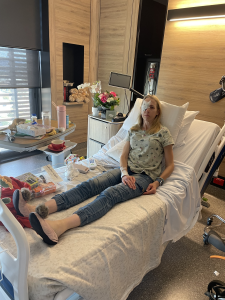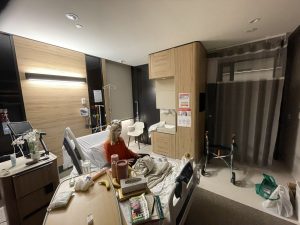 My recent admission to hospital has shown me that although people might have the best intentions, they can sometimes miss the mark.
My recent admission to hospital has shown me that although people might have the best intentions, they can sometimes miss the mark.
When we want to care for someone in a vulnerable state, it’s always important to look at the whole experience, not just the part you’re supporting.
There were three instances where I found this to be really prevalent.
First, it was when I was told by the doctor that I had to have a lumbar puncture in the ED on day one. I was taken from my wheelchair onto a bed in the room where the procedure would take place. Right before they began, I asked if there was anything afterwards that I had to do or be aware of. They told me I needed to lie flat for 4 – 6 hours to avoid headaches. Little did the doctor know that I was already busting to use the bathroom.

If the doctor had talked me through the entire procedure before I went into the room, I could have easily been wheeled into the bathroom first and avoided holding things up. Instead, the nurses had to help me from the bed, into the chair and out of the room. It all would have been a lot more comfortable for everyone involved as I felt that this delay caused frustration amongst the medical staff.
And speaking of using the bathroom, this was another time when I had to make the choice to forgo my dignity and privacy for my safety and comfort.
I needed help from the nurse to wheel my drip into the bathroom whilst I used my walking frame. Although I was in a very nice, private room at the hospital, the design of the room wasn’t taking accessibility into account; my walking frame wouldn’t fit through the bathroom doorway. See a video of my unsafe attempts here!
The first few times I had to use the bathroom, the nurse informed me that she would leave me be, and to “just press the button” when I was done, and she’d be back.
I did just that, and no response. Nothing.
I waited. And waited.
No one was coming.
So instead of sitting on the cold toilet any longer, I risked falling and walked my frame and the drip back to my bed. It was dangerous to be in such a weakened state and put that physical demand on my body. I’ll be honest, more than a few times I nearly slipped.
I decided that I didn’t want to take the risk of falling. From that point on, every time I needed to use the bathroom, I asked the nurse to stay in the room until I had finished. Although it was not an ideal position, having a person hovering over you when you were in such an exposed state, at least she could help me back to my bed.
I’m sure that the numerous nursing staff she did have the best intentions of coming back once she saw the button being pressed by me. But it’s a hospital and things happen and if no one comes back, I’m left there. Seriously, should a vulnerable person have to compromise their dignity and forgo the rapport they have built with another to feel safe?
Another instance, later in my admission, was another example of how our own actions can only heighten the challenge for another. As many of you know, movement has always been more beneficial to me than medication when it comes to pain. However, during my recent admission the doctors were giving me pain medication that was making the pain worse rather than better. I needed to move and decided to take my pain management into my own hands and get my physio into the hospital.
 His treatment was amazing and significantly reduced my pain. However, it was difficult for me afterwards as all the furniture in the room had to be moved around to create space for my session. And when he left, he forgot to move it back. I was busting to go to the loo but my walking frame was out of my reach on the other side of the room and he had moved a chair in the doorway in front of the bathroom. Thankfully, a nurse helped move everything and I was able to safely get to the toilet. However, having to move these things around felt as though it counteracted all the good work that movement had just done.
His treatment was amazing and significantly reduced my pain. However, it was difficult for me afterwards as all the furniture in the room had to be moved around to create space for my session. And when he left, he forgot to move it back. I was busting to go to the loo but my walking frame was out of my reach on the other side of the room and he had moved a chair in the doorway in front of the bathroom. Thankfully, a nurse helped move everything and I was able to safely get to the toilet. However, having to move these things around felt as though it counteracted all the good work that movement had just done.
Another thing that my team of medical professionals overlooked was my admission form. A week into my hospital stay, a nurse came and sat in my room with a long form she had to fill out.
My dad asked: “What is this form for?”
“It’s actually her admission form that should have been done when she first got here a week ago.” The nurse told us, embarrassed.
There were questions being asked about if I had hearing aids, glasses and a walking frame. Things that the hospital definitely needed to know in order to care for me. This information was unknown to them for a week whilst I was under their care.
Although I’ve highlighted the obstacles I experienced, I’m merely attempting to convey how such instances can easily cloud the amazing care received. When we look at someone’s care when we are in a support role, it’s so important to consider every aspect of how our actions can help or hinder. We always have the best of intentions and don’t want to make things worse, but simple awareness of a more holistic approach can make such a difference.
We don’t want to leave vulnerable people feeling helpless.
I encourage you to reflect on your caregiving and how you can take a “bigger picture” approach to words and actions. Just something small can easily make all the difference.